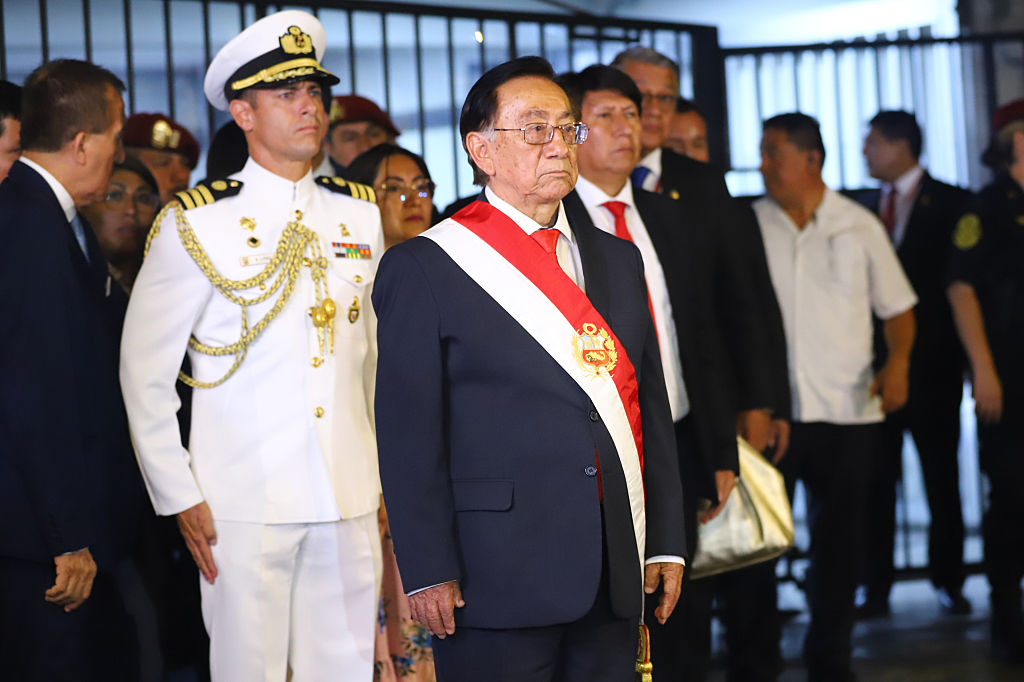Roundtable Discussion on Latin American Democracy
Roundtable Discussion on Latin American Democracy
At the AS/COA book launch for Latin America's Struggle for Democracy panelists looked at how the economic downturn could affect regional democracies.
At a recent AS/COA roundtable, contributors and editors from a new book on Latin American democracy discussed challenges and recent progress made in strengthening democratic institutions over the past 20 years. Latin America’s Struggle for Democracy, edited by Larry Diamond, Marc F. Plattner, and Diego Abente Brun, is a compilation of recent articles from the Journal of Democracy along with new material. The AS/COA roundtable discussion focused on themes raised in select book chapters, with a focus on the overall future of democracies in the region.
Introduction:
- Marc F. Plattner, Co-editor, Journal of Democracy; Vice-President for Research and Studies, National Endowment for Democracy; Co-director; International Forum for Democratic Studies (Editor)
Participants:
- Diego Abente Brun, Deputy Director, International Forum for Democratic Studies, National Endowment for Democracy (Editor; contributor)
- Jorge G. Castañeda, Global Distinguished Professor of Politics and Latin American Studies, New York University (Contributor)
- María Victoria Murillo, Associate Professor of Political Science and International Affairs, Columbia University (Contributor)
- Christopher Sabatini, Senior Director of Policy, AS/COA; Editor-in-Chief, Americas Quarterly (Contributor; moderator)
The Many Roles and Faces of Democracy
Over the past 20 years, the democratic world has shown decreasing interest in Latin America. For Marc Plattner, the goal of this book is to revive global attention toward the region by highlighting the different roles for democracy. As was indicated by Diego Abente, democracy does not mean the same thing in every country. In fact, democracies can be looked at in three categories: liberal democracy, hybrid democracy, and inclusionary democracy. The last is a more progressive brand of liberal democracy that exists in countries like Chile and Costa Rica.
Democracy in the Current Economic Context
In the current environment, a central question was how the economic downturn will affect Latin American democracies. Overwhelmingly, panelists agreed that the main problem will be sustaining social policy programs despite deepened monetary constraints. Each country will face this challenge differently.
What will be the likely impact on democratic institutions? According to Victoria Murillo, Argentina proved during the last economic crisis that its democracy is consolidated enough to resist military rule during tough times. Countries like Peru and Bolivia face greater threats to their democracies due to pent-up popular frustration and a lack of political renovation. Institutions are fragile and the military seems to be “waiting in the barracks,” according to Jorge Castañeda.
Poverty and Inequality
Poverty and inequality present significant challenges to democracy. In a brief discussion of labor, Christopher Sabatini looked at the large informal sector present throughout the region. This is a direct result of labor inflexibility, particularly the onerous hiring and firing procedures seen in firms throughout the region. The large group of workers that remains “out of the system,” both politically and economically, needs attention and to be included in the formal labor force.
Panelists agreed that the large informal workforce is problematic, and cautioned that social policies should be structured so that great incentives remain for workers to join the formal sector.
If not, according to Jorge Castañeda, workers will see no benefit in joining a system that offers equal services but with the mandatory caveat of paying taxes. Social policies are important for poverty reduction. But there is an associated risk if a country is not prepared to commit to long-term policies that include strict guidelines and regulations.
Making Democracy Inclusive
Are democracies in Latin America inclusive of minorities? Victoria Murillo stressed that ethnicity and gender only appear on the agenda when there exists the potential for political gains. For example, political parties often ignore indigenous populations when their voting bloc is relatively small. In countries with large indigenous populations, a federal rather than unitary system of government would be more effective in ensuring that indigenous voices are heard at a local and national level. Female concerns are often overlooked since Latin American women tend to be sharply divided along class lines.
The media can play a key role in democratic inclusiveness. Panelists agreed that the press has helped to change regional politics, and today, most citizens learn about government action through the media—a sign of progress in regard to the freedom of expression.
Inclusive democracy depends on outside actors being a part of the process. In Mexico, according to Jorge Castaneda, the biggest obstacle is that electoral laws essentially prevent any party besides the Institutional Revolutionary Party (PRI), National Action Party (PAN), and Party of the Democratic Revolution (PRD) from being a formidable force in national politics. As Victoria Murillo noted, democracy depends on a system of checks and balances, and above all, on the ability for the opposition to challenge incumbent parties.
Conclusion
A key question remains: Will the progress made in Latin America over the past 20 years remain despite the economic downturn? The answer is inconclusive and depends heavily on the degree of outside aid and support. Much of the progress made thus far has been precarious, leaving space for backtrack.
Latin America needs to focus on locking in already-achieved democratic advances. Spain could be a good role model as it was able to secure democratic practices rather quickly following the end of authoritarian rule. Addressing issues of inclusion is also a priority. Citizens’ basic democratic rights depend on their representation in politics and the government.







